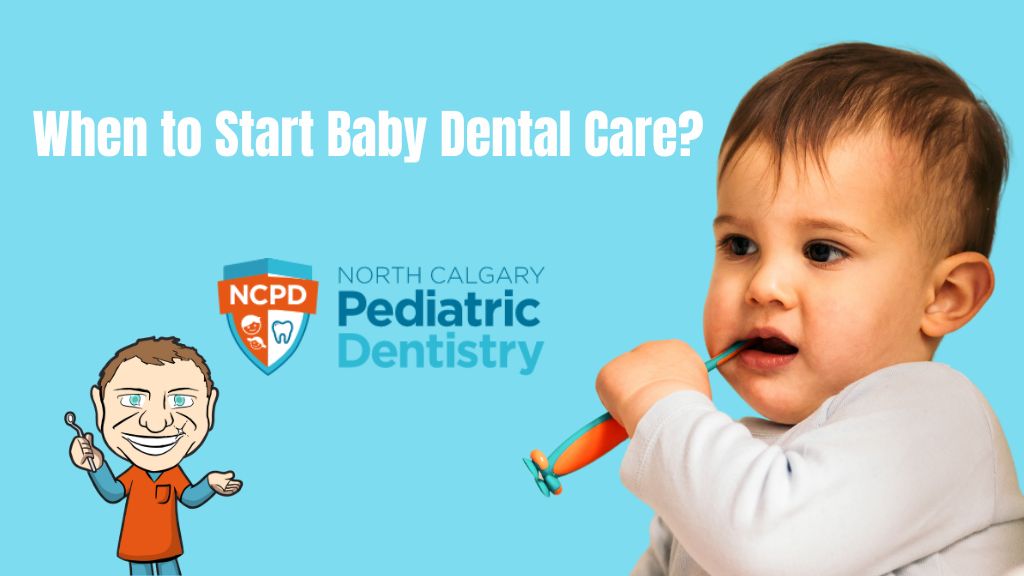CLOSE
Parents often wonder: When should I bring my baby to the dentist? It’s one of the most common questions I hear as a pediatric dentist here in North Calgary. The truth is, baby dental care starts much earlier than many people think — and starting early makes a big difference for your child’s lifelong oral health.
At North Calgary Pediatric Dentistry, our goal is to guide families through every stage of a child’s dental development. From that very first tooth to teenage smiles, early and consistent care sets the foundation for healthy habits and confident smiles.
It may surprise you, but dental care begins before your baby even has teeth. After feeding, gently wipe your baby’s gums with a soft, damp cloth. This removes milk or formula residue and helps your baby get used to the idea of having their mouth cleaned.
Why does this matter? Because bacteria can still build up on the gums, and introducing oral hygiene early makes brushing easier once teeth appear. Think of it as laying the groundwork for healthy routines.
The general rule is: first tooth, first dental visit. For most babies, that happens around 6 months, but it can be earlier or later. As soon as a tooth erupts, it’s exposed to bacteria and can develop cavities. Bringing your child to the dentist at this stage allows us to check alignment, enamel health, and growth patterns.
At North Calgary Pediatric Dentistry, we make those first visits relaxed and positive. The focus is less about treatment and more about helping parents learn how to care for tiny teeth while making sure your child feels comfortable in the dental chair.

Even if no teeth have appeared yet, the Canadian Dental Association recommends a baby’s first dental checkup by their first birthday. Why? Because those early years are critical for:
Think of it as preventive care: the earlier we can guide you, the easier it is to avoid problems later.
Once teeth erupt, brush them gently twice a day with a small, soft-bristled toothbrush. Use a rice-sized smear of fluoride toothpaste. As your child grows, keep brushing for them until they develop the coordination to brush effectively on their own (usually around age 7 or 8).
Also remember: cavity prevention isn’t just about brushing. Limit sugary snacks and drinks, avoid putting your baby to bed with a bottle, and encourage water as the go-to drink.
Parents sometimes delay, thinking: “They’re just baby teeth — they’ll fall out anyway.” But baby teeth are important for so many reasons:
Starting early also helps children build trust and familiarity with the dentist. Instead of waiting until a problem arises, kids see the dentist as a normal and positive part of life.
Your baby’s dental health is part of their overall well-being. Beginning dental care at home in the first months and scheduling that first visit around the time of the first tooth (or by age one) ensures a strong foundation for years to come.
At North Calgary Pediatric Dentistry, Dr. Cameron Zealand and our team love welcoming babies and families into the world of dental care. We use gentle techniques, a child-focused environment, and clear guidance for parents.
Don’t wait for cavities or dental pain to appear. Give your baby the advantage of early care and positive dental experiences. Book your child’s first dental visit today at North Calgary Pediatric Dentistry — where Dr. Cameron Zealand helps children grow up smiling, confidently and cavity-free.
PHONE
(403) 295 8010
HOURS
Mon to Fri: 7:00am to 3:00pm
Saturday: Closed
Sunday: Closed

© 2022 North Calgary Pediatric Dentistry - All Rights Reserved | SEO and Website by Jaw Drop Marketing
This site is machine-translated from English, and may have errors in translating the information from English to the language you have chosen. This translation service is provided to encourage communications between the reader and North Calgary Pediatric Dentistry and will not be perfect. There may be errors in the translation including missing or added words, or poor translation of a dental related term or concept. The best way to obtain complete information is to contact us directly. Your questions are welcome, please feel free to contact us. Services are provided in English.